This month as I look back 77 years ago, I could never have imagined that in just one night of violence, my childhood would be shattered, illusions of what my future held forever broken, and that the journey I began as a 14-year-old boy would build who I am today.
I was born as Werner Rindsberg in 1924 and raised in Mainstockheim, a village near Wuerzburg, Bavaria. Until 1933, our 900-population community provided a peaceful and pleasant life for the well-integrated 25 Jewish families. My father was a co-founder and president of the local soccer club and I was on the boys’ team. The national anthem conveyed our German pride, “Today Germany will listen to us, tomorrow all the world will listen.” But this all changed quickly after the Nazis came to power. My parents, brothers and I all faced anti-Semitic insults and discrimination, but my parents told my brothers and me not to make waves. So we continued to flourish in school, athletics, and enjoyed the joys of being early teenage boys.
But, the previously irksome acts of prejudice escalated. There was a boycott of Jewish businesses, and Jewish civil servants and teachers were dismissed from their jobs. The SA brown shirts in our village marched and sang an ominously different anthem, “Today we own Germany, tomorrow we will own the world.” My middle school teachers began teaching Nazi ideology, and my teammates started to call me “dirty Jew.” The Nazi regime stripped our citizenship, and I felt the fragileness of my freedoms, our civil liberties and rights as human beings, being pulled away.
On Nov. 9, 1938, our lives were shattered unexpectedly, and we found ourselves under attack with no idea what was occurring all over Germany and Austria that same day. On Kristallnacht, “The Night of Broken Glass,” the first nationwide, visible assault on Jews unleashed unprecedented violence, with Nazi mobs smashing windows and burning hundreds of Jewish-owned businesses and synagogues. My father and I were wrongfully arrested along with 30,000 other Jewish men and children, and we were thrown into the county jail. I was only 14, so I was released three days later, but my father and the other men were sent to Dachau for four to six weeks.
The events of Kristallnacht and my father’s incarceration in Dachau made it clear that our worst fears were becoming reality. My father would never talk about his experiences because they had threatened to arrest him again if he did. But the aftermath of that one night changed the fate of the Jews of Germany and my family. My parents learned that Belgium was accepting Jewish children from Germany as refugees and they decided to send me alone rather than risk waiting. I survived because of their decision and because of the many heroes who helped the Jews, including the Belgian rescue committee and their government. I was lucky to escape with 90 other children to southern France in 1940, but was now alone, without my two brothers or parents.
I never saw my family again. My mother’s American siblings brought me to New York in August 1941, and I learned that my parents and two younger brothers were deported to Poland and murdered in the gas chambers in early 1942. When I landed in Brooklyn to start my new life, I was determined to never allow my rights to be taken away again. Fortunately, I was able to deal with my family’s horrible fate and that of millions of other innocents. I did this by deciding that the German criminals had spoiled the first 17 years of my life – but that they would not get even one more minute.
The following year, I was drafted into the U.S. Army, and was exposed to the prevailing prejudices in America. With the German-Jewish name of Werner Rindsberg, I was “not part of the American mainstream.” So when I became a U.S. citizen, I chose to live my life as “Walter Reed,” born and raised in Brooklyn, New York, a non-Jew whose parents died in a car accident. I hid my past in order to have an “equal rights” future.
This is why I speak out today to school children and adults as a member of the Illinois Holocaust Museum & Education Center’s Speakers’ Bureau. I tell my story because I firmly believe that no nation should ever forget that the breakdown of humanity and of our communities begins when our freedoms are taken away. It is our duty to remain vigilant, and to heed the warnings of 77 years ago that portended the eventual murder of 6 million European Jews and millions of other innocent victims. We must recognize how fragile our “normalcy” is, and determinedly protect our rights and those of others.

